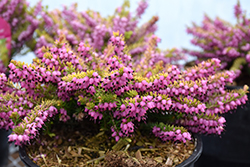Height: 16 inches
Spread: 18 inches
Sunlight:
![]()
Hardiness Zone: 6b
Other Names: Darley Dale Heath
Description:
One of the toughest and more tolerant of heaths to a variety of soils and moisture conditions, this variety features lovely pink flowers along upright spikes in late winter and early spring; makes a great groundcover in a mass planting
Ornamental Features
Mary Helen Heath is clothed in stunning spikes of pink bell-shaped flowers rising above the foliage from late winter to early spring. It has green evergreen foliage which emerges chartreuse in spring. The tiny needles remain green throughout the winter.
Landscape Attributes
Mary Helen Heath is a multi-stemmed evergreen shrub with a mounded form. It lends an extremely fine and delicate texture to the landscape composition which should be used to full effect.
This is a relatively low maintenance shrub, and should only be pruned after flowering to avoid removing any of the current season's flowers. It is a good choice for attracting bees to your yard. It has no significant negative characteristics.
Mary Helen Heath is recommended for the following landscape applications;
- Mass Planting
- General Garden Use
- Groundcover
- Naturalizing And Woodland Gardens
Planting & Growing
Mary Helen Heath will grow to be about 14 inches tall at maturity, with a spread of 18 inches. It tends to fill out right to the ground and therefore doesn't necessarily require facer plants in front. It grows at a medium rate, and under ideal conditions can be expected to live for approximately 20 years.
This shrub should only be grown in full sunlight. It does best in average to evenly moist conditions, but will not tolerate standing water. It is not particular as to soil type, but has a definite preference for acidic soils, and is subject to chlorosis (yellowing) of the foliage in alkaline soils. It is somewhat tolerant of urban pollution. Consider applying a thick mulch around the root zone in winter to protect it in exposed locations or colder microclimates. This particular variety is an interspecific hybrid.
Disclaimer - This resource is provided for informational purposes only and does NOT reflect current availability. Inventory varies seasonally, so we cannot guarantee that every plant will be in stock at all times - please contact your favourite GardenWorks location directly for current availability. It does not include our entire inventory of plants, so be sure to visit GardenWorks to see varieties that may not be represented on this list.

